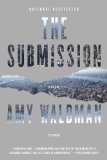Summary | Excerpt | Reading Guide | Reviews | Beyond the Book | Readalikes | Genres & Themes | Author Bio

A Novel
by Amy Waldman
"Perhaps we should talk more about the local context," said Madeline, a community power broker from the neighborhood ringing the site. As if on cue, Ariana extracted from her bag a drawing she had made of the Void to show how well it would play against the cityscape. The Void's "vertical properties," she said, echoed Manhattan's. Claire arched her eyebrows at Paul. Ariana's "sketch," as she called it, was better than the drawings accompanying the submission. Claire had complained to Paul more than once that she suspected Ariana knew the Void's designer - a student, a protégé? - because she seemed so eager to help it along. Maybe, although he didn't think Ariana had done any more for her favorite than Claire had for hers. For all her poise, Claire couldn't seem to handle not getting her way. Nor could Ariana, who was used to dominating juries without this one's slippery quota of sentiment.
The group retreated to the parlor, with its warm yellow walls, for dessert. Jorge, the chef at Gracie Mansion, wheeled in a cart laden with cakes and cookies. Then he unveiled, with little fanfare, a three-foot-high gingerbread reconstruction of the vanished towers. The shapes were unmistakable. The silence was profound.
"It's not meant to be eaten," Jorge said, suddenly shy. "It's a tribute."
"Of course," said Claire, then added, with more warmth, "It's like a fairy tale." Chandelier light glinted off the poured-sugar windows.
Paul had piled his plate with everything but the gingerbread when Ariana planted herself in front of him like a tiny spear. In concert they drifted toward a secluded corner behind the piano.
"I'm concerned, Paul," Ariana said. "I don't want our decision based too much on" - the last word almost lowed - "emotion."
"We're selecting a memorial, Ariana. I'm not sure emotion can be left out of it entirely."
"You know what I mean. I worry that Claire's feelings are having disproportionate impact."
"Ariana, some might argue that you have disproportionate impact. Your opinions command enormous respect."
"Not compared to a family member. Sorrow can be a bully."
"So can taste."
"As it should be, but we're talking about something more profound than taste here. Judgment. Having a family member in the room - it's like we're letting the patient, not the doctor, decide on the best course of treatment. A little clinical distance is healthy."
Out of the corner of his eye, Paul saw Claire deep in conversation with the city's preeminent critic of public art. She had seven inches on him, with her heels, but she made no effort to slouch. Dressed tonight in a fitted black sheath - the color, Paul suspected, no incidental choice - she was a woman who knew how to outfit herself for maximum advantage. Paul respected this, although respect was perhaps the wrong word for how she figured in his imaginings. Not for the first time, he rued his age (twenty-five years her senior), his hair loss, and his loyalty - more institutional than personal, perhaps - to his marriage. He watched her detach herself from the critic to follow yet another juror from the room.
"I know she's affecting," he heard; his eyeing of Claire had been unsubtle. He turned sharply toward Ariana, who continued: "But the Garden's too soft. Designed to please the same Americans who love impressionism."
"I happen to like impressionism," Paul said, not sure whether to pretend he was joking. "I can't muzzle Claire, and you know the family members are more likely to support our design if they feel part of the process. We need the emotional information she provides."
"Paul, you know there's a whole critique out there. If we pick the wrong memorial, if we yield to sentimentalism, it only confirms - "
"I know the concerns," he said gruffly: that it was too soon for a memorial, the ground barely cleared; that the country hadn't yet won or lost the war, couldn't even agree, exactly, on who or what it was fighting. But everything happened faster these days - the building up and tearing down of idols; the spread of disease and rumor and trends; the cycling of news; the development of new monetary instruments, which in turn had speeded Paul's own retirement from the chairmanship of the investment bank. So why not the memorial, too? Commercial exigencies were at work, it was true: the developer who controlled the site wanted to remonetize it and needed a memorial to do so, since Americans seemed unlikely to accept the maximization of office space as the most eloquent rejoinder to terrorism. But there were patriotic exigencies, too. The longer that space stayed clear, the more it became a symbol of defeat, of surrender, something for "them," whoever they were, to mock. A memorial only to America's diminished greatness, its new vulnerability to attack by a fanatic band, mediocrities in all but murder. Paul would never put it so crudely, but the blank space was embarrassing. Filling in that blank, as much as Edith's ambitions, was why he had wanted to chair the jury. Its work would mark not only his beloved city but history, too.
Excerpted from The Submission by Amy Waldman. Copyright © 2011 by Amy Waldman. Excerpted by permission of Farrar, Straus & Giroux. All rights reserved. No part of this excerpt may be reproduced or reprinted without permission in writing from the publisher.




Music is the pleasure the human mind experiences from counting without being aware that it is counting
Click Here to find out who said this, as well as discovering other famous literary quotes!
Your guide toexceptional books
BookBrowse seeks out and recommends the best in contemporary fiction and nonfiction—books that not only engage and entertain but also deepen our understanding of ourselves and the world around us.